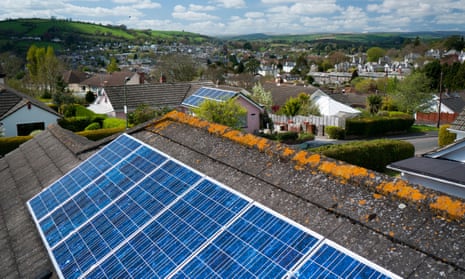Panasonic, one of the world’s largest electronics companies, has urged
the UK government to think again about its plans to cut subsidiesfor homeowners who install solar panels.
The Japanese company, which is a major supplier of solar panels in Britain, said it normally tried to avoid intervening in political decisions but could not stand by and watch the industry being attacked.
Amber Rudd, the energy and climate change secretary, said 10 days ago that she would consult on plans to reduce financial support for solar energy installations in a bid to ease the burden on bill payers.
Daniel Roca, the UK country manager for the solar division of Panasonic, urged ministers to think again about their proposals, which involve some feed-in tariff subsidies (Fits) being cut by almost 90%.
“Let’s keep [the industry] alive, let’s help it further develop to become fully independent from state support, with energy storage and a closer involvement of utilities. But let’s not push the bird out of the nest before it can properly fly,” he said.
“We therefore urge the UK government to immediately open dialogue with the solar industry during this consultation period to evaluate and significantly reduce and balance these proposed cuts and the substantial damage they will inevitably and irreversibly cause.”
The strong words from Panasonic follow warnings of a wholesale collapse in the industry from the panel installer Solarcentury. The proposed changes to the Fits come shortly after the early phase out of the renewable obligation subsidy, a support mechanism for larger renewable electricity projects.
Frans van den Heuvel, the chief executive of Solarcentury, said: “In little more than three months, the Conservative government has literally turned upside down the certainties which had characterised the UK renewables market and the cross-party consensus that underpinned it.
“If the consultation is enacted, we can expect to see a wholesale collapse in solar take-up by homeowners and businesses ... So much for Amber Rudd’s promised ‘solar revolution’ and the former Conservative energy minister’s pledge to put ‘rocket boosters’ under the non-domestic roof sector.”
The solar trade bodies have also been up in arms about the changes, which come on top of plans to reduce or axe aid for onshore wind installations, energy efficiency schemes and a climate change levy to encourage renewables.
At the time the solar consultation on Fits was announced, the Department of Energy and Climate Change (DECC) defended it as necessary to avoid huge budget overruns. “We are taking urgent action to get a grip of this overspend and protect hardworking bill payers. Our support has driven down the cost of renewable energy significantly,” said a DECC spokeswoman.
“As costs continue to fall and we move towards sustainable electricity investment, it becomes easier for parts of the renewables industry to survive without subsidies.”
